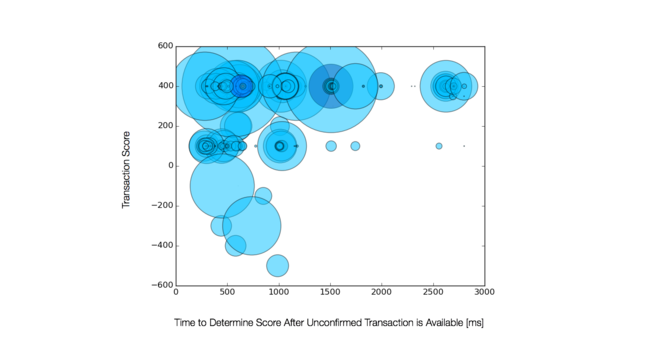Is Scoring Needed For Bitcoin Fast Transactions?

 Though Bitcoin is a very revolutionary technology, it lacks the ability to provide a high degree of assurance for users needing to facilitate fast transactions. Brick and mortar and e-commerce merchants need to be able to complete Bitcoin transactions in under a minute. To fully confirm a Bitcoin transaction, it takes 6-10 confirmations, which can take over an hour.
Though Bitcoin is a very revolutionary technology, it lacks the ability to provide a high degree of assurance for users needing to facilitate fast transactions. Brick and mortar and e-commerce merchants need to be able to complete Bitcoin transactions in under a minute. To fully confirm a Bitcoin transaction, it takes 6-10 confirmations, which can take over an hour.
Bitcoin fast transactions are transactions that are completed before the transaction is confirmed six times; many brick and mortar stores will give customers the product after the transaction shows up in their wallets with zero confirmations. While online merchants have the ability to stall the sale until the transaction has matured, there still isn’t a community consensus on what to do about the fast transaction issue.
Also read: Adam Draper’s Boost VC Focuses On Bitcoin – Will Fund 20-30 New Bitcoin Companies
How Can We Accept Bitcoin Fast Transactions?
Fast transactions are very vulnerable to double spend attacks, where an individual can attempt to spend the same coins twice, taking advantage of the lack of confirmations on a transaction. Transactions become exponentially more difficult to cheat as the number of confirmations increases. For brick and mortar stores that need a way to facilitate fast transactions with a higher level of assurance, there needs to be a better way to serve Bitcoin customers quickly and safely.
Coinalytics has developed a scoring system that reports the reliability of a transaction by analyzing inputs as they appear on nodes in the network. According to a blog post on their site, this is how it works:

During a transaction, relationships between an address and prior transactions feed into the blockchain. This creates a rich and highly useful graph for analysis of transaction quality within a short time frame. The scoring process is quick and near real-time as is possible. It consists of tracing, once a transaction starts to appear on various nodes, back at least 10 ancestors deep. Deep analysis can then find a block missing, or a transaction input spent somewhere else. When analyzing errant transactions, as well as valid ones, there are patterns that emerge in Bitcoin’s blockchain. As a result, each new transactional input appearing on the network can be scored. The Coinalytics scoring platform obtains transaction data and parses it immediately. Then, a score for an unconfirmed transactions are available within seconds of it appearing on the network. Pre-block pattern identification and scoring has a lot of value for Bitcoin as a payment method. Ultimately, many Bitcoin stakeholders simply cannot wait for 6-10 confirmations for a transaction to complete. They need better transactional assurance of addresses in near real-time.
This method of scoring gives users greater confidence in the reliability of a Bitcoin transaction and provides loss prevention for their business as they will significantly reduce the amount of fraudulent fast transactions. With an effective system to evaluate the reliability of fast transactions, more merchants will consider Bitcoin integration for point of sale transactions. Scoring will likely become very important in the future as many more businesses begin to accept Bitcoin. Having reliable transactions is crucial for the future adoption and success of Bitcoin. Coinalytics is a platform that will bring real-time data and analytics of the blockchain as well as news aggregation to users once complete. You can find out more about Coinalytics here.
What do you think about scoring fast transactions? Comment below!
Images via Coinalytics and Shutterstock.